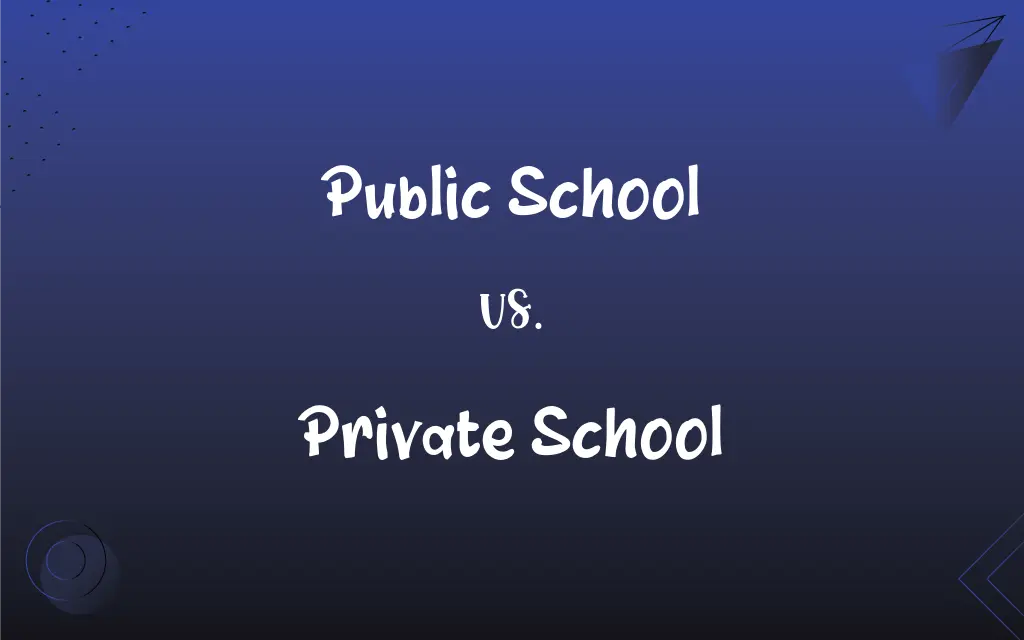Public School vs. Private School: What's the Difference?
Edited by Aimie Carlson || By Janet White || Published on November 24, 2023
Public Schools are funded and operated by government entities, while Private Schools are operated by private organizations or individuals and funded mainly through tuition and donations.

Key Differences
When parents consider educational options for their children, they often weigh between Public Schools and Private Schools. These two categories distinctly differ in their operations and funding mechanisms.
Public Schools are institutions that the government, whether local, state, or federal, primarily funds. Because they rely on taxpayer money, Public Schools are often accountable to governmental bodies and must adhere to specified educational standards. On the contrary, Private Schools operate independently of such governmental oversight, as they're funded primarily by student tuition, private donations, or religious institutions.
The curriculum in Public Schools is typically standardized and adheres to state or national guidelines. In contrast, Private Schools can offer specialized or alternative curriculums, sometimes focusing on arts, religion, or rigorous academic pursuits. This flexibility can be an appealing factor for some parents and students.
Admission procedures also differ. Public Schools generally admit students based on their residential area, ensuring all children in a region have access to education. Private Schools, however, might have selective admission processes, requiring interviews, tests, or auditions.
The debate between Public Schools and Private Schools often centers on quality, class sizes, resources, and cost. While Public Schools provide universally accessible education, Private Schools might offer specialized experiences at a premium.
ADVERTISEMENT
Comparison Chart
Funding
Primarily government-funded
Primarily funded through tuition and donations
Oversight
Governmental oversight
Operated independently or by private organizations
Curriculum
Standardized according to state/national guidelines
Often specialized or flexible
Admission
Generally based on residential area
Selective, may require tests or interviews
Tuition Fees
Typically free or minimal fees
Fees vary, often higher
ADVERTISEMENT
Public School and Private School Definitions
Public School
An educational institution accessible to all eligible students in an area.
She transferred to the nearest Public School after moving.
Private School
An educational institution with selective admission criteria.
He prepared extensively for the Private School entrance test.
Public School
A school operated under governmental jurisdiction.
The Public School follows state-mandated curriculums.
Private School
An institution operated independently from government funding.
Their daughter attends a prestigious Private School.
Public School
An institution funded mainly by governmental entities.
My children attend the local Public School.
Private School
A school funded primarily through tuition and donations.
The Private School relies on alumni donations for scholarships.
Public School
A state-operated institution for education.
Public Schools ensure universal access to education.
Private School
A school often offering specialized or alternative curriculums.
This Private School focuses on arts and humanities.
Public School
A school financed by taxpayer money.
The new Public School building was built using local tax revenues.
Private School
A non-state institution for education, sometimes religiously affiliated.
The catholic Private School has a rich history in town.
Public School
Attributive form of public school
Public-school student
Public School
Alternative form of public school
FAQs
Are Private Schools always religiously affiliated?
No, while many are, there are also secular Private Schools.
Do Private Schools have to follow state curriculums?
Private Schools have more flexibility and may or may not follow state curriculums.
Do Public Schools offer special education programs?
Yes, Public Schools typically provide special education programs as mandated by law.
Can a Public School refuse admission?
Generally, Public Schools can't refuse admission to students in their district unless at capacity.
Can Private Schools offer scholarships?
Yes, many offer scholarships based on merit, need, or other criteria.
Are Public Schools always free?
Most Public Schools offer free education, but there might be some fees for extracurriculars or materials.
Are Private Schools always more expensive?
Often, but not always. Tuition varies, and some Private Schools offer scholarships.
How are Public School teachers credentialed?
They usually hold state certifications or licenses.
Do Public Schools offer extracurricular activities?
Yes, many Public Schools offer sports, arts, and clubs.
Can Public Schools offer religious education?
No, Public Schools in the U.S. are separated from religious teachings due to the First Amendment.
Do Private Schools have standardized testing?
Some do, but they may not be bound to state tests like Public Schools.
Are all Private Schools elite or prestigious?
No, there's a wide range of Private Schools with varied reputations and offerings.
How do Private School class sizes compare to Public Schools?
Private Schools often have smaller class sizes, but it varies.
How are Public Schools held accountable?
They are often accountable to state education boards and must meet certain performance standards.
Are Public Schools open to all students?
Typically, they serve students based on geographic districts.
About Author
Written by
Janet WhiteJanet White has been an esteemed writer and blogger for Difference Wiki. Holding a Master's degree in Science and Medical Journalism from the prestigious Boston University, she has consistently demonstrated her expertise and passion for her field. When she's not immersed in her work, Janet relishes her time exercising, delving into a good book, and cherishing moments with friends and family.
Edited by
Aimie CarlsonAimie Carlson, holding a master's degree in English literature, is a fervent English language enthusiast. She lends her writing talents to Difference Wiki, a prominent website that specializes in comparisons, offering readers insightful analyses that both captivate and inform.







































































